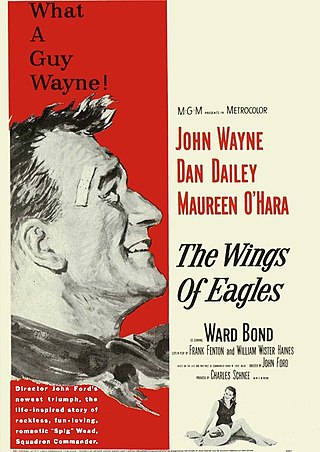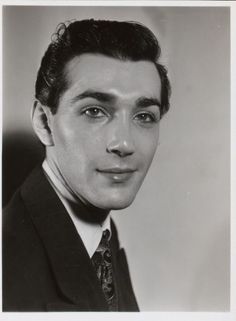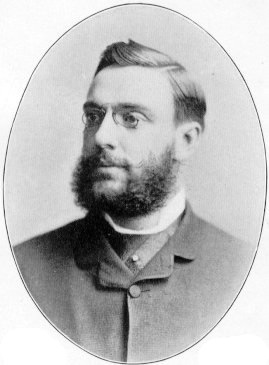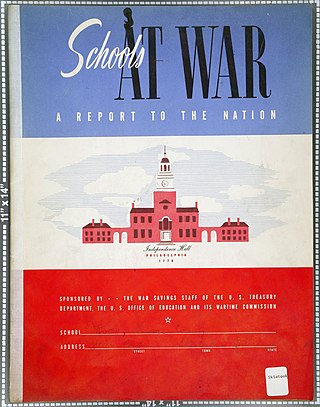External links
- The Autobiography of a 'Jeep' is available for free viewing and download at the Internet Archive
- The Autobiography of a 'Jeep' at IMDb
- Complete film as flash stream on blip.tv
| The Autobiography of a 'Jeep' | |
|---|---|
| Directed by | Joseph Krumgold (uncredited) |
| Produced by | Office of War Information |
| Edited by | Gene Fowler Jr |
Release date |
|
Running time | 9 minutes |
| Country | United States |
| Language | English |
The Autobiography of a 'Jeep' is a 1943 propaganda film produced by the US Office of War Information. As its name might suggest, it is the story of parts of World War II told from the perspective of a WW II jeep.
The Jeep tells us he comes from a country with many roads and cars. He mentions pre-war plans for highways and cities that had to be scrapped because of the war, and the sacrifices the personalized Jeep is making for the war effort.
The Jeep then makes his first appearance before the servicemen, his experience in the desert and passing rivers and his nervousness in front of more experienced vehicles like the tank. Finally the Jeep proves his mettle and is put in general production, ridden by presidents and royalty. All this time he is accompanied by his friend, the American soldier.

Jeep is an American automobile brand, now owned by multi-national corporation Stellantis. Jeep has been part of Chrysler since 1987, when Chrysler acquired the Jeep brand, along with other assets, from their previous owner American Motors Corporation (AMC).
"The Purple Testament" is the nineteenth episode of the American television anthology series The Twilight Zone. It is "the story of a man who can forecast death". It originally aired on February 12, 1960, on CBS.

The Wings of Eagles is a 1957 American Metrocolor film starring John Wayne, Dan Dailey and Maureen O'Hara, based on the life of Frank "Spig" Wead and the history of U.S. Naval aviation from its inception through World War II. The film is a tribute to Wead from his friend, director John Ford, and was based on Wead's "We Plaster the Japs", published in a 1944 issue of The American Magazine.

Auburn was a brand name of American automobiles produced from 1900 to 1937, most known for the Auburn Speedster models it produced, which were fast, good-looking and expensive. However, after the 1929 Wall Street Crash, and the economic downturn that ensued, Auburn's expensive automobiles, along with its also very expensive sister marques Duesenberg and Cord, saw inevitable sales downturns, and all vehicle business halted in 1937.
A commando is an elite light infantry or special forces soldier, trained for quick raid operations.

Eugene the Jeep is a character in the Popeye comic strip. A mysterious animal with magical or supernatural abilities, the Jeep first appeared in the Thimble Theatre comic strip. He was also present in animated versions of Popeye's adventures, including three of the Fleischer Studios shorts of the late 1930s/early 1940s, with more extensive appearances in later Popeye cartoons produced for TV.

Jeepers Creepers 2 is a 2003 American horror film written and directed by Victor Salva. A sequel to the 2001 film Jeepers Creepers, the film portrays the Creeper, a demonic creature and mysterious serial killer who pursues a school bus filled with high-school students. Ray Wise also appears as Jack Taggart, a farmer who seeks to hunt down and kill the Creeper as revenge for his younger son whom the Creeper had murdered that same week. Additionally, Francis Ford Coppola returned to the franchise as an executive producer.

Kaiser Jeep resulted from the 1953 merger of Kaiser Motors, an independent passenger car maker based in Willow Run, Michigan, with the Toledo, Ohio-based Willys-Overland Company.

Rick Jason was an American actor. He is most remembered for starring in the ABC television drama Combat! (1962–1967).

The Willys MB and the Ford GPW, both formally called the U.S. Army truck, 1⁄4‑ton, 4×4, command reconnaissance, commonly known as the Willys Jeep, Jeep, or jeep, and sometimes referred to by its Standard Army vehicle supply nr. G-503, were highly successful American off-road capable, light military utility vehicles. Well over 600,000 were built to a single standardized design, for the United States and the Allied forces in World War II, from 1941 until 1945. This also made it the world's first mass-produced four-wheel-drive car, built in six-figure numbers.
Joseph Quincy Krumgold was an American writer of books and screenplays. He was the first person to win two annual Newbery Medals for the most distinguished new American children's book.
"5 O'Clock Charlie" was the 26th episode of the M*A*S*H television series, and second of season two. The episode aired on September 22, 1973.

The Ford GPA "Seep", with supply catalog number G504, was an amphibious version of the World War II Ford GPW jeep. Over 12 thousand were made and they served with Allied forces in the many theatres of WW2, including the Pacific, Eastern front, and from D-day to the end. After the war as surplus they found many niche roles, and today examples can be found in museums collections or at military history shows.

The jeep cap, sometimes referred to as the jeep hat, originally the US Army issued Cap, Wool, Knit, M1941 is a knit cap with a short visor made mostly from knitted yarn, originally wool, but now typically acrylic. Also sometimes referred to as a "skull cap" due to its popularity with skateboarders, or a "Radar cap" due to the cap being made famous by the character Radar O'Reilly from the hit US TV sitcom M*A*S*H.

Military light utility vehicle, or simply light utility vehicle (LUV), is a term used for the lightest weight class military vehicle category. A Jeep-like four-wheel drive vehicle for military use by definition lighter than other military trucks and vehicles, inherently compact and usually with light or no armour, with short body overhangs for nimble all-terrain mobility, and frequently around 4-passenger capacity.
Delmar Gerle "Barney" Roos was an American automotive engineer who served as Studebaker's head of engineering from 1926 to 1936, specialising in straight-eight engines. He later worked for the British Rootes Group in the design of Humber, Hillman and Sunbeam Talbot cars. Before World War II, he returned to the United States, where he co-designed the Willys MB, the original Jeep.

Willys was a brand name used by Willys–Overland Motors, an American automobile company, founded by John North Willys. It was best known for its design and production of World War II–era military jeeps (MBs), Willys M38 and M38A1 military jeeps as well as civilian versions, and branding the 'jeep' military slang-word into the '(Universal) Jeep' marque.

Four Jills in a Jeep is a 1944 American comedy-drama musical film starring Kay Francis, Carole Landis, Martha Raye and Mitzi Mayfair as themselves, reenacting their USO tour of Europe and North Africa during World War II.

Thomas Augustus Watson was an assistant to Alexander Graham Bell, notably in the invention of the telephone in 1876.

The American Schools at War program was a program during World War II run by the U.S. Treasury Department, in which schoolchildren set goals to sell stamps and bonds to help the war effort. The program was also administered by the U.S. Office of Education, the Federal government agency that interfaced with the nation's school systems and its thirty-two million students. The Office, however, allowed the Treasury to work with the schools directly as the main objective of the program was raising money.